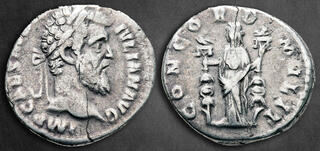Lot description:
Didius Julianus AD 193. Rome
Denarius AR
18 mm, 2,51 g
IMP CAES [M DID] IVLIAN AVG, laureate head right / CONCORD MILIT, Concordia standing facing, head to left, holding aquila and vexillum.
Very Fine, crack
RIC IV 1; BMCRE 2; RSC 2.
Didius Julianus, whose full name was Marcus Didius Severus Julianus, was a Roman Emperor who ruled for a brief period in AD 193. He was born around AD 133 and held various prominent positions in the Roman government before becoming Emperor.
In AD 193, after the assassination of Emperor Pertinax, the Roman Empire was plunged into a period of political instability known as the "Year of the Five Emperors." Didius Julianus saw an opportunity and, with the support of the Praetorian Guard, purchased the title of emperor from the guardsmen. His actions led to accusations of corruption and bribery, as he effectively bought the position.
However, his reign was short-lived and controversial. His accession was widely disliked by both the Senate and the Roman people. Moreover, three other powerful generals declared themselves as emperor in different parts of the Empire, leading to a civil war. As a result, Didius Julianus was deposed and executed by the Senate after only about two months in power. He was succeeded by Septimius Severus, one of the other contenders in the civil war, who would go on to establish the Severan dynasty.
Starting price: 200 EUR |  |